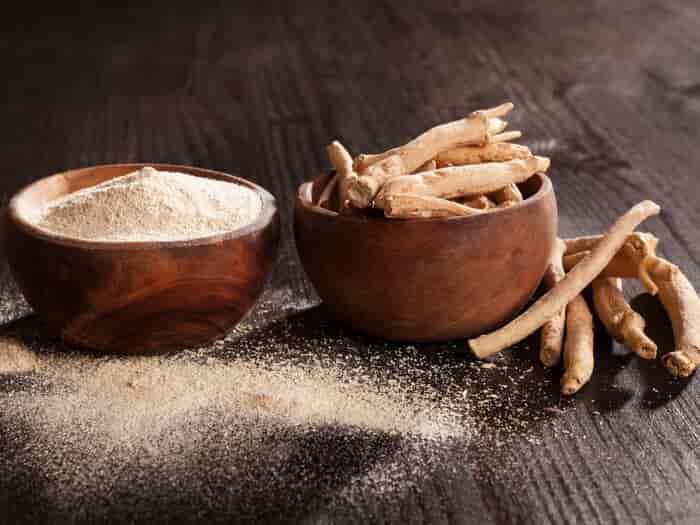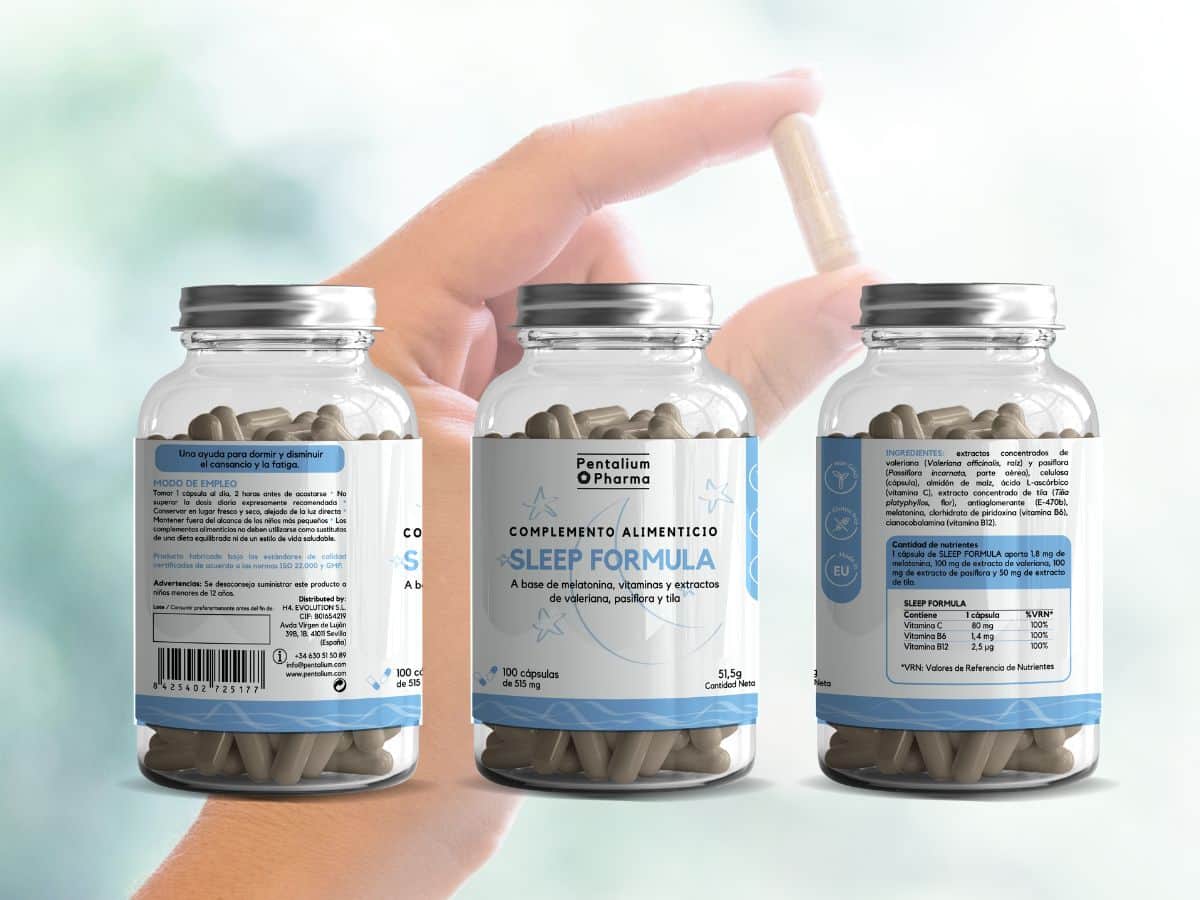
8 Benefits of Ashwagandha according to Scientific Evidence

Tabla de contenidos
What is Ashwagandha?
Ashwagandha(Withania somnifera [L.] Dunal)-nicknamed «Indian ginseng» or «winter cherry» for its deep red berries-is a shrub native to the Indian subcontinent. Within the Ayurvedic system, its roots and leaves have been used for over 2000 years to promote «resilience» in the face of stress, fatigue and age-related diseases. Its roots concentrate withanolides, the group of steroidal lactones to which most of its biological effects are attributed.
Stress and anxiety are today the most prevalent emotional disorders in the general population. In the short term they can be managed with sleep hygiene, exercise and therapy; however, if they become chronic they promote hypertension, depression and cognitive impairment. This is the main reason why Ayurvedic phytotherapy has gained interest among mental health professionals.
However, they can become phenomena that are difficult to control, generating serious health problems. If you suffer from stress and persistent anxiety over time, we recommend the use of this plant.

Preparations based on root and leaf show, in modern clinical trials, a modulation of the hypothalamic-pituitary-adrenal axis (HPA axis) that results in lower cortisol, better stress tolerance and a greater sense of physical and mental vitality, without causing caffeine-like nervous stimulation.
What does Ashwagandha do in your body?
Ashwagandha is known for its ability to enhance well-being naturally. It acts on neurochemistry by enhancing GABAergic signaling and regulating serotonergic receptors, which promotes relaxation without excessive sedation. It also reduces stress by decreasing cortisol secretion, balancing the body’s response to stressful situations.
In terms of physical health, Ashwagandha has antioxidant and anti-inflammatory properties, blocking inflammatory pathways such as NF-κB and activating Nrf2, which reduces inflammation and cell damage. It also improves mitochondrial efficiency and oxygen uptake, which contributes to its ergogenic effect, enhancing athletic performance.
More and more studies studies are supporting its benefits, highlighting its potential to improve sleep, memory sleep, memory, attention and immune function, making Ashwagandha an integral supplement for health and well-being.making Ashwagandha an integral supplement for health and wellness.
Properties of Ashwagandha What are its benefits?
Improves brain function (memory and attention).
Ashwagandha is known for its cognitive properties, and several studies suggest that this plant may be especially beneficial for people with mild cognitive impairment or schizophrenia. Scientific research has shown that ashwagandha improves attention, response time and mental performance.
A study study of 50 adults found that the consumption of 600 mg of ashwagandha extract per day for 8 weeks significantly improved the following measures:
- Recent and general memory
- Attention to
- The speed of information processing
2 Increases sports performance
Ashwagandha has been recognized as an effective supplement for improving physical performance, especially in terms of endurance and oxygenation capacity.
In a study with 12 participants, those who took doses between 120 mg and 1,250 mg daily showed remarkable improvements in their aerobic capacity, including an increase in VO₂ max.
An analysis of 5 scientific studies revealed that ashwagandha not only improves maximal oxygen consumption capacity (VO₂ max), but also helps increase muscle strength.
For example, in an 8-week studyFor example, in an 8-week study, men who took 600 mg/day during their weight training experienced a significantly greater increase in muscle strength and size compared to those who took placebo.
This supplement is an excellent choice for athletes and exercise enthusiasts looking to boost their performance without resorting to stimulants.

3 Helps reduce stress and anxiety
Probably the most recognized benefit of ashwagandha is its ability to reduce stress and anxiety. Classified as an adaptogen, ashwagandha helps the body better manage the negative effects of stress by reducing levels of cortisol, the well-known «stress hormone.»
Heat shock proteins (Hsp70), cortisol and c-Jun N-terminal stress-activated protein kinase (JNK-1) are some of the stress mediators that ashwagandha appears to help regulate. (see study).
It also decreases the activity of the body’s HPA axis, which controls how your body responds to stress. (see study).
The supplements containing ashwagandha may help reduce stress and anxiety, according to numerous research studies.
In one trial those taking 250-600 mg daily for 8 weeks experienced a significant reduction in perceived stress and cortisol levels compared to the placebo group. Participants also reported a significant improvement in sleep quality.
Another study study involving 60 people found that those who consumed 240 mg of ashwagandha root extract ashwagandha root extract per day for 60 days experienced much lower anxiety levels than those who received a placebo and demonstrated that ashwagandha is effective in reducing anxiety in people with high levels of stress, making it an excellent choice for those seeking natural, side-effect-free relief.
4 Lowers blood sugar levels
Ashwagandha has been shown to be effective in lowering blood sugar levels, making it an excellent supplement for people with diabetes or those with elevated glucose levels.
According to an analysis of 24 research studies, including 5 clinical trials in people with diabetes, revealed that administration of ashwagandha significantly reduces blood glucose levels, hemoglobin A1c (HbA1c), insulin levels and blood lipids. This effect is largely due to withaferin A (WA), a compound in ashwagandha that improves glucose uptake into cells, promoting more effective glucose control.
5 Reduces inflammation
Active compounds in ashwagandha, such as withaferin A (WA), have powerful anti-inflammatory effects. WA has been shown to act on key inflammatory pathways, inhibiting factors such as NF-κB and Nrf2, which are involved in regulating inflammation in the body.
In a 2008 study conducted in 2008showed that participants who took ashwagandha for 60 days experienced a significant reduction in C-reactive protein, an important marker of inflammation. These effects, moreover, may benefit those seeking to improve their overall well-being and reduce the risk of chronic inflammatory diseases.
Another very effective supplement against inflammation is curcumin. curcuminif you want to know its benefits you can do it through this link.
- WHAT THE SCIENCE SAYS | The recommended dose of ashwagandha supported by…
- HOW MUCH SHOULD I TAKE | The Energy formula contains 100 capsules of 250 mg of concentrated ashwagandha extract, along with a combination of nutrients that…
- BENEFITS AND PROPERTIES | The combination of ashwagandha and B vitamins offers…
- ORGANIC AND VEGAN | manufactured under certified quality standards according to ISO 22.000 and GMP norms. Main ingredients: Concentrated extract of Ashwagandha.
6 Reduces symptoms of some mental illnesses
Ashwagandha has also been shown to be effective in improving mental disorders such as depression and anxiety.
In one studyIn one study, 66 people with schizophrenia who took 1,000 mg/day of ashwagandha for 12 weeks experienced a significant reduction in anxiety and depression, compared to the placebo group.

In addition, the results of another study point to ashwagandha supplementation as a possible treatment for schizophrenia that may reduce overall symptoms and perceived stress.
A 2012 study found that stressed individuals who took 600 mg of ashwagandha extract daily for 60 days experienced a 77% reduction in depressive symptoms, compared to a 5% reduction in the placebo group.
The results may not be applicable as only one participant in this study had a history of depression.
Clinical evidence does suggest that ashwagandha should not be used in place of antidepressant medication, although some research suggests that it may have some antidepressant effects in some individuals, but never as a substitute for treatment prescribed by a physician. We recommend consulting a physician if you are showing signs of depression so that you can receive the necessary assistance or therapy.
7 Helps improve sleep
Ashwagandha is known for its effects on improving sleep quality. Several studies indicate that it may be effective in treating sleep-related problems such as insomnia.
At a study conducted with 50 older adults, those who took 600 mg daily for 12 weeks reported a significant improvement in sleep quality and increased mental alertness upon awakening.
In addition, an evaluation of five scientific trials concluded that ashwagandha significantly improves overall sleep quality. These effects were most noticeable in people with insomnia who took more than 600 mg per day for 8 weeks or more.
8 Helps increase testosterone and increase fertility in men.
Ashwagandha is also known for its effects on male fertility and testosterone.
In an eight-week studyIn an eight-week study, 43 overweight men between the ages of 40 and 70 suffering from mild fatigue were given either ashwagandha extract tablets or a placebo.
DHEA-S, a sex hormone involved in testosterone synthesis, increased 18% more during ashwagandha treatment. A 14.7% increase in testosterone was observed in participants taking ashwagandha compared to those taking a placebo.
An analysis of four trials also revealed that men with low sperm counts experienced significant improvement in sperm concentration, semen volume and motility when given ashwagandha.
In men with normal sperm counts, sperm concentration and motility were also improved.
However, the researchers concluded that more high-quality trials are needed to support the potential benefits of ashwagandha on male fertility.
Ashwagandha dosage: How much should you take per day?
Each capsule of Energy Formula contains 250 mg of ashwagandha extract, an adequate dose to support your daily well-being. It is recommended to take one capsule a day with breakfast, although in situations of acute stress, you can increase the dose to two ashwagandha capsules a day. It is important not to exceed the recommended dose, as ashwagandha has a powerful effect on the body, so it should be consumed responsibly.
The ashwagandha is a natural supplement with proven benefits for improving key areas of health, such as reducing stress, enhancing physical performance, controlling blood glucose and supporting mental health. If you are looking for a natural, effective, science-backed solution to improve your quality of life, ashwagandha is an excellent choice to integrate into your routine.
Written by:
- WHAT THE SCIENCE SAYS | The recommended dose of ashwagandha supported by…
- HOW MUCH SHOULD I TAKE | The Energy formula contains 100 capsules of 250 mg of concentrated ashwagandha extract, along with a combination of nutrients that…
- BENEFITS AND PROPERTIES | The combination of ashwagandha and B vitamins offers…
- ORGANIC AND VEGAN | manufactured under certified quality standards according to ISO 22.000 and GMP norms. Main ingredients: Concentrated extract of Ashwagandha.




